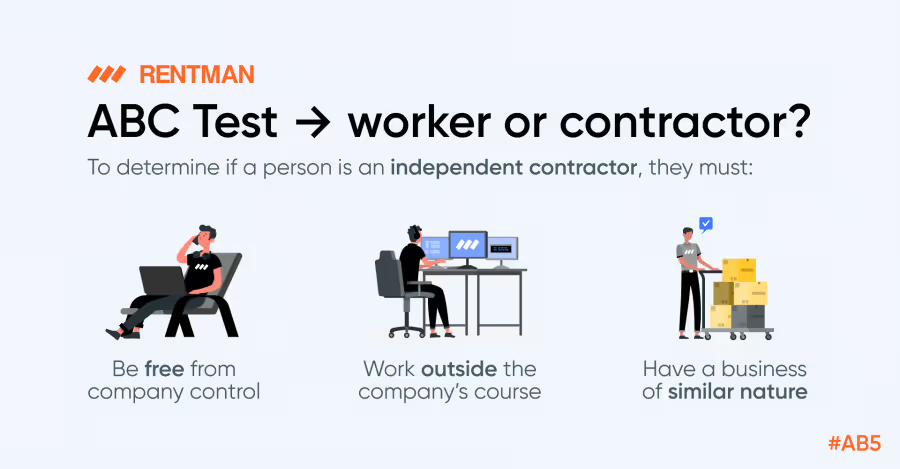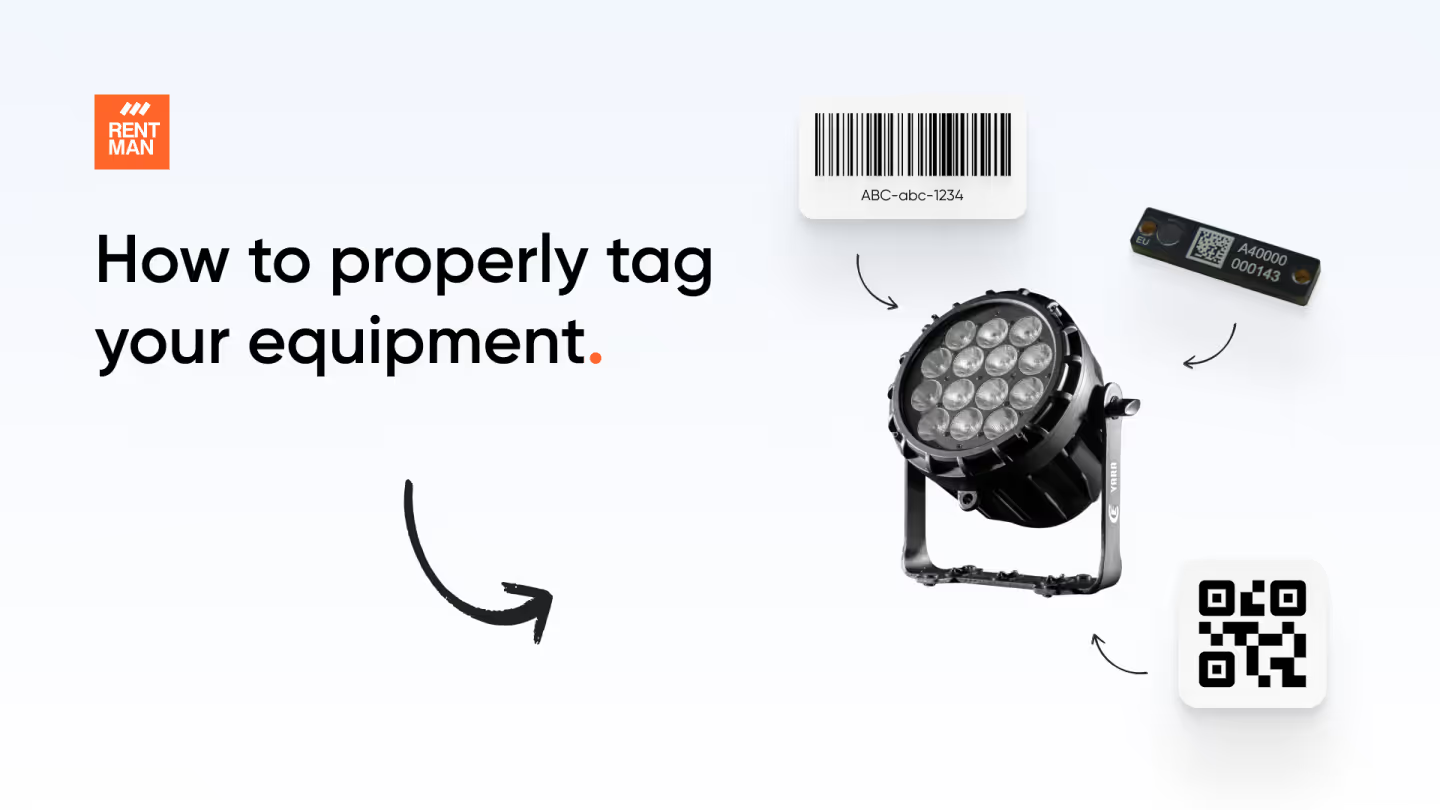Understanding California's AB 5 Law: What event companies need to know

At first sight, California’s AB5 Law sounds vague and broad. Does that mean your event company can’t work with freelancers anymore? Should you bypass new bookings in California to avoid stringent regulations?
Don’t worry, it’s not all bad. No need to cancel upcoming events. The AB5 law explained: It protects workers by ensuring independent contractors aren’t exploited and guarantees their access to essential benefits.
Here’s everything you need to know about the AB5 law so you can remain compliant whether you routinely work in California or are thinking of expanding your operations:
1. The basics of the AB5 law and who it impacts
2. How to determine if someone is an employee or independent contractor in California
3. How will this impact the industry?
4. Communicating with your team under AB5
5. How to comply with the AB5 Law?
6. Frequently asked questions
What is AB5 and who does it apply to?
California’s AB5 Law, also known as the gig worker bill, establishes clear guidelines for classifying workers as employees or independent contractors in the gig economy.
This new law aims to better protect crew and employees and ensure fewer people get taken advantage of and lose out on benefits due to loopholes. Because contract employees are entitled to greater labor protection such as minimum wage, paid sick leave, and unemployment insurance, the law closes exploitative loopholes.
Does the AB5 law apply to my event company?
If you’re an event or production company that:
- Is based in California,
- Works with freelancers who are California residents (even if the event takes place in another state),
- Organizes events in the State of California,
The AB5 Law applies to you.
How to determine if someone is an employee or independent contractor in California
As an employer, you’ll need to prove that your short-term workers don’t qualify as employees. How can you do this? Until 2018, the Borello test was used to determine this. Now, companies must use the ABC test, established by the California Supreme Court in the Dynamex case, to assess worker classifications.
The ABC test highlights three conditions a person must meet to be considered an independent contractor. These are:
- An independent contractor must be free from the control and direction of the company they're working for. Meaning you have no say over a worker’s schedule, work location, or how the work is performed. If you are dictating all of these aspects, then this person is classified as an employee under the AB5 Law.
- An independent contractor must be performing work that is outside the course of your company's usual business. This ensures their role doesn’t overlap with the hiring entity’s business, preventing misclassification under the law. The worker’s tasks must fall outside the usual course of the hiring entity’s business activities to qualify as independent contracting. For example, hiring a designer to redo your website can be justified as an independent contractor.
- An independent contractor must have an established business of the same nature as the work performed for your company. An independent contractor must also demonstrate they operate as an independently established trade, reinforcing their role outside the hiring entity’s direct control. For example, degreed professionals such as lawyers could qualify as independent contractors under this criteria.

How does California’s AB5 law impact the AV and event industry?
A lot of companies in this industry rely on freelancers to help them during events and productions. From stagehands to brand ambassadors, these people often only come to work for your company when a specific type of event is being held.
Because these people are labeled as independent contractors (or 1099 freelancers), they need to maintain their own worker's compensation insurance and are not entitled to benefits such as sick time or overtime pay.
However, with the passing of the AB5 Law in California, some of your freelance help may now be considered employees. To determine if that’s the case, ask yourself these two questions:
- Do you provide your crew with any direction when performing work on your event?
- Is your crew performing work outside of your typical scope of work?
If you answered yes to either of these, you’ll need to revisit your working arrangement with the freelancers you employ.

Communicating with your team under AB5
As California’s AB5 law reshapes how you classify their workers, clear communication becomes even more critical. Whether you're working with freelancers or full-time employees, ensuring everyone understands their role and expectations is key to avoiding misclassifications and compliance issues. Clear definitions of roles help the hiring entity avoid legal issues while ensuring compliance with AB5 regulations.
How AB5 effects communication
With AB5 potentially reclassifying some freelancers as employees, it’s vital to communicate job details, schedules, and role expectations clearly. Misunderstandings can lead to legal complications or operational disruptions. Using tools like Rentman can help centralize communication, ensuring all workers are aligned with their duties—whether temporary or permanent.
Key Communication Strategies
- Job Instructions: Rentman’s Crew Planner allows you to post jobs, track availability, and send detailed instructions, ensuring clarity and reducing confusion, especially when roles change under AB5.
- Real-Time Updates: With Rentman’s Job Board and automated email invites, you can quickly notify your team about changes to schedules, job duties, or classifications, so everyone is on the same page.
- Avoid Overlapping Roles: Rentman’s Crew Insights helps track worker qualifications and past roles, preventing misassignments and ensuring tasks align with their reclassified roles under AB5.
- Mobile Access: Rentman’s mobile app ensures your crew receives real-time updates on the go, eliminating communication delays and keeping everything on track.
Streamlining Communication for Compliance
As you adjust to AB5, effective communication tools will help prevent confusion and ensure legal compliance. Rentman consolidates all job details, schedules, and updates in one platform, making it easier to manage both freelancers and employees seamlessly.
How can I keep running my business and remain cost-effective while complying with AB5?
We’ve explained a lot of facts that can feel overwhelming, but it’s not all bad. If you operate in the state of California, here’s what you can do to keep your business running and stay in compliance with AB5.
Review your work classification
For starters, review your worker classifications to ensure that everyone who works for you or with you is properly classified as an employee or independent contractor. This will help you avoid legal risks and potential fines down the line. And it’s fairly easy to hire people as temporary event staff.
Analyze the cost of your freelancers
In addition, analyze how much your freelancers are costing your business. Using Rentman’s Crew Scheduling software, look at their tracked hours and pay rates. See how often you’re working with certain people and how much it’s costing you. If you rely on a handful of people often, it could be worth hiring them as temporary staff.
Offset additional costs by adjusting your rates
If you do need to hire more in-house employees, you can offset this cost by increasing your rates. Educate your customers about AB5 and explain how one hundred percent of the people you're sending on-site will be contract employees. This will create a sense of safety and loyalty amongst your customers.
In addition, the advantage of hiring someone in-house over an independent contractor is that you’ll be sharing the FICA tax burden with your employee. And that’s money you get to keep in your pocket.
Find the right worker’s comp
Another option to offset costs is to properly research and shop around for the right worker’s comp insurance. Additionally, investing in tailored workers compensation benefits ensures both compliance and financial protection for your business. Find the best option that fits your business requirements and provides the exact coverage you need.
AB5 is here to stay
The AB5 law is here to stay as courts have refused to strike it down.
However, it’s not all negative. Your event and production company can keep operating in California. Simply think back to the ABC test when considering the extra manpower you will need for an event. You might need to hire temporary workers instead of independent contractors, you can offset those costs via the event itself or by putting systems in place that help control labor costs elsewhere.
Armed with information, you can operate in California with a lot more ease.
Conclusion: Navigating AB5: A roadmap for event companies
California’s AB5 law may feel like a major adjustment for event companies, but with the right approach, it can become an opportunity to strengthen your business practices. The law’s aim is to create fairer working conditions, and by aligning your operations to meet its requirements, you can build a reputation for ethical practices and reliability—qualities that resonate with both workers and clients.
Understanding and complying with the ABC test is essential to maintaining operations in California. By properly classifying workers and making necessary adjustments to your staffing strategy, you can avoid legal risks while continuing to deliver exceptional events. Communication is key, and tools like Rentman can simplify this process by centralizing schedules, job roles, and updates, ensuring your team operates seamlessly despite new regulations.
Adapting to AB5 doesn’t mean compromising your profitability. By revisiting your pricing strategy, educating clients on the value of compliant practices, and leveraging tools to optimize worker scheduling, you can offset additional costs while maintaining your bottom line. Additionally, investing in the right workers’ compensation insurance and evaluating whether frequent freelancers should transition into temporary employees can provide long-term benefits.
AB5 may feel like a challenge, but it’s also an opportunity to future-proof your event business. By staying informed and proactive, you can continue to thrive in California’s dynamic event landscape. With clear strategies and the right tools in place, your company can adapt confidently to AB5 while preserving your commitment to excellence.
Frequently asked questions
Frequently asked questions
The ABC test, also known as the Dynamex ABC Test, determines whether someone is an employee or an independent contractor. Based on three criteria, you’ll know if someone meets the standards to be considered an independent contractor or not.
Before the ABC test, the Borello test was used to determine whether someone was an independent contractor or an employee. As of January 1st, 2018, the Borello test has been replaced by the ABC test.
Both the Borello test and the ABC test puts the burden on companies to prove whether a worker is an employee or an independent contractor. But, the ABC test is designed to make it easier to determine ahead of time whether someone can be considered an independent contractor or not. So your company knows upfront the situation you’re getting into.
Making such a mistake will be a costly one for your business. Fines range from $5,000 to $25,000. So you’ll want to avoid such a situation at all costs and get informed beforehand.
AB5 changed the status of some independent workers to employees. Meaning these people are entitled to benefits such as minimum wage, paid business expenses, sick days, and work breaks. However, this also means such workers have less freedom when it comes to deciding their working hours.
No, the law is only applicable to the State of California. But it does impact you even if you don’t operate there but work with independent contractors that are California residents.
Previous blog posts

How a serial number works and why you should use it
How a serial number works and why you should use it

How to set Asset Tags for your Equipment: A Comprehensive Guide for Rental Businesses
How to set Asset Tags for your Equipment: A Comprehensive Guide for Rental Businesses

